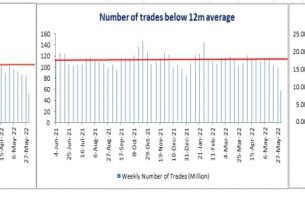
Raghvendra Nath is the Managing Director of Ladderup Wealth Management
“This time around, inflation has really spiked and is so broad and pervasive that it is looking very difficult that it could be harnessed only by raising interest rates,” Raghvendra Nath, Managing Director at Ladderup Wealth Management, said in an interview to Moneycontrol.
He further said high inflation and rising interest rates together may impact growth of most developed economies and it may not come as a surprise if some enter recession.
Nath feels volatility is likely to persist over the next one year or so: “There is a multitude of local and global factors driving up volatility and many of these factors are going to persist for the foreseeable future.”
Do you expect recession in developed nations if inflation concerns persist?
Most developed nations including most large European countries and the United States had very moderate inflation pre-pandemic. This was despite the large scale monetary easing during the global financial crises. That encouraged these central banks to become even more aggressive when pandemic struck.
However, this time around, inflation has really spiked and is so broad and so pervasive that it is looking very difficult that it could be harnessed only by raising interest rates.
High inflation and rising interest rates together may impact growth of most of these economies and it may not come as a surprise if some enter recession.
Do you think the pain of inflation has already been discounted by the market?
While the valuations have generally come off, there are still chances of further correction. No one knows whether the current inflationary situation shall worsen or not in the coming months.
In case recessionary risks increase or inflation spikes further, we can expect more volatility in stock prices. Generally, the extreme bullishness of last year has been replaced with caution and doubt. At such times, even small negative news gets more attention and impacts valuations.
What are the pockets of opportunities available for investing now considering the recent correction?
In every volatile period where investor sentiment is shaky, quality stocks become the best bet as wide institutional interest acts as a natural hedge against sharp corrections. Also value stocks start getting noticed more and many of these companies are known for high dividend yields.
IT stocks corrected sharply with the Nifty IT index falling more than 19 percent. Is it the time to bet on this space?
It is never a good idea to go and buy sectors or stocks just because one has witnessed a sharp correction. The valuations in IT stocks had certainly gone overboard during the pandemic as work from home had suddenly increased the demand for enhanced IT services.
The correction in prices does not yet ensure that valuations are now reflective of near term growth. So one should tread carefully and evaluate each company on its own merit rather than just relying on price correction.
Is the worst over for the market?
Yes, market volatility is likely to persist over the next one year or so. There is a multitude of local and global factors driving up volatility and many of these factors are going to persist for the foreseeable future. For instance, high inflation in the United States may slow down the economy creating a risk of stagflation.
Or the imported inflation in India is real and persistent due to our high oil dependence. Not only does it impact domestic demand but also creates pressure on the rupee. Or, in a scenario where most economies are raising interest rates, India may also have turned around its easy money policy for good and that means credit growth for both retail and corporate segments may be slower in the future.
From a valuation standpoint too, the last two years of rally had stretched valuations of most good quality businesses and a consolidation may be good for stock prices in the long run.
There is a good chance that we may see more volatility ahead.
Do you think consistent volatility could dampen domestic flow?
Domestic flows in equity markets have of course been very strong offsetting the sustained FPI (foreign portfolio investor) selling that we have witnessed in the last six months. While domestic retail flows continue to remain strong, it is equally true that negative returns tend to dampen investors’ risk appetite leading to lower flows in equity markets. The good thing is that systematic investing has caught on very widely in India and is growing stronger with time. Hopefully, the flows in equity markets shall continue to see improvement.
Disclaimer: The views and investment tips expressed by investment experts on Moneycontrol.com are their own and not those of the website or its management. Moneycontrol.com advises users to check with certified experts before taking any investment decisions.
Download your money calendar for 2022-23 here and keep your dates with your moneybox, investments, taxes


